Conduct a free Pennsylvania warrant search today, whether it’s a case of personal safety, an aspect of investigative work, or you’re simply curious about someone’s record.
This streamlined resource is tailored to those who seek precise and up-to-date information regarding warrants. It covers the search procedures and provides details necessary to effectively navigate relevant databases. Finding warrants quickly and seamlessly when they’re needed is the key.
Are Warrants Considered Public Records in PA?
In the Commonwealth of Pennsylvania, warrants are considered public records, according to PA Code Rule 212 and PA Code Rule 513.1
This means access to warrant information is available to the public upon request or by performing a warrant search. Individuals may inquire about the existence of a warrant for a particular person or more than one person.
Specific procedures need to be followed, and searches or inquiries are required to go through certain channels, such as law enforcement agencies or online databases. There may also be limitations on the details disclosed due to privacy and legal considerations.
If an existing warrant is part of a current investigation or hasn’t yet been executed, the document may not be available for public viewing. Typically, warrants are made public 72 hours after they’re issued or immediately following execution. Several types of warrants exist, such as bench, arrest and search warrants. Know the type of warrant needed prior to conducting a search.
A Look at Pennsylvania Warrant Searches in the Commonwealth
When conducting a Pennsylvania warrant search, individuals should adhere to general policies and procedures to ensure a lawful and respectful process. Utilize official resources such as a county sheriff’s website, police department databases and online platforms of court records.
The agency selected will depend upon the type of offense and where it occurred. If there’s suspicion of a federal arrest warrant, contact the federal court in the relevant district to verify its existence.
Searchers should always follow privacy laws and regulations when seeking warrant information. Avoid attempting to access private databases without proper authorization.
The best resource is local and state police departments. Always be professional when reaching out to them. Clearly state the request and be prepared to provide necessary details, such as the individual’s first and last name, as well as the state where the person lives or where the warrant was possibly issued.
There are instances when an individual may have been traveling in another state when an offense occurred, leading to warrants outside their state of residence. The person’s date of birth and the county or city of residence, along with any other specific identifiable information, can help narrow down or expedite the search process. Be aware that not all departments may provide information over the phone.
How To See If You or Someone Else Is Wanted in Pennsylvania (Free Searches)
Within Pennsylvania, free warrant search avenues are accessible to the public. Typically, law enforcement agencies in the state maintain databases containing information about wanted individuals within their jurisdiction.
Individuals interested in searching for a possible warrant can freely utilize these databases. The portals are regularly updated and managed by county sheriff’s offices, ensuring the information remains current and accurate.
When performing a statewide search for warrants, individuals should look to the Pennsylvania Unified Judicial System portal.2 A free account is required for use, and keywords such as first name, last name and warrant issue date will help ensure a more accurate match. Results from the search will typically provide the following:
- Name
- Age
- Most recent address
- Details pertaining to the offense
- Issuing agency
- Date warrant was issued
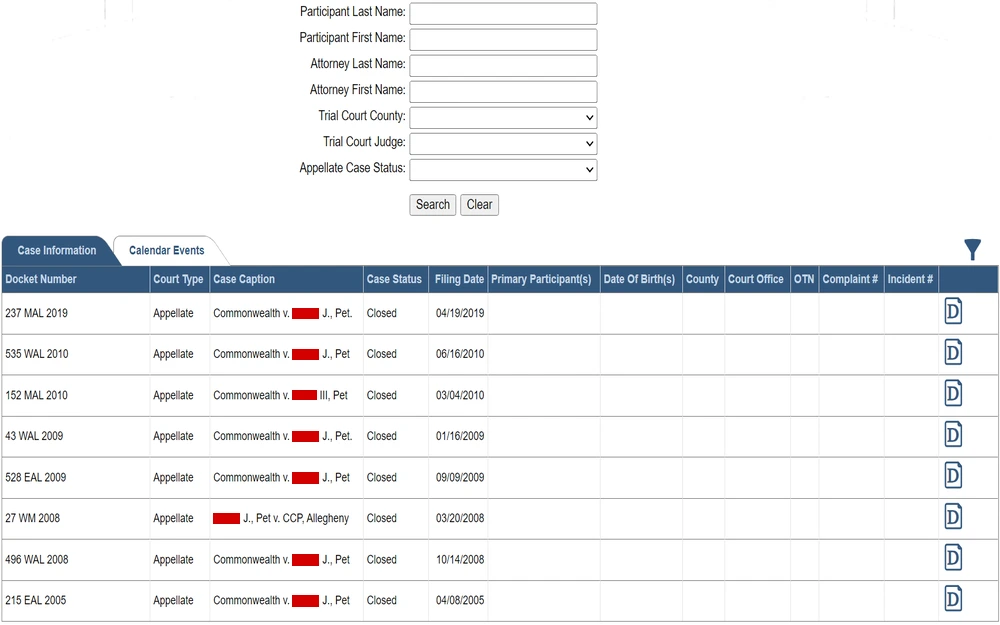
There’s also a free app that can be downloaded called PAeDocket. It offers a simple search for existing court cases and dockets, with search options by case number, participant name, police incident or offense tracking number.
Should individuals wish to conduct an offline search, requests can be made directly to the Pennsylvania Judicial Center at the following address:
Pennsylvania Judicial Center
601 Commonwealth Avenue
PO Box 61260, Suite 1500
Harrisburg, PA 17106
Note: The physical address for making inquiries in person is the same as above without the PO Box designation.
For specific access to public records pertaining to criminal history, individuals can utilize the PATCH system, which stands for Pennsylvania Access to Criminal History. In addition to details often contained in a standard background check, these reports will provide confirmation of any existing warrants for the individual in question.
A $22 fee will be charged for online requests and $20 for mail-in requests. The status of requests can also be checked online.4
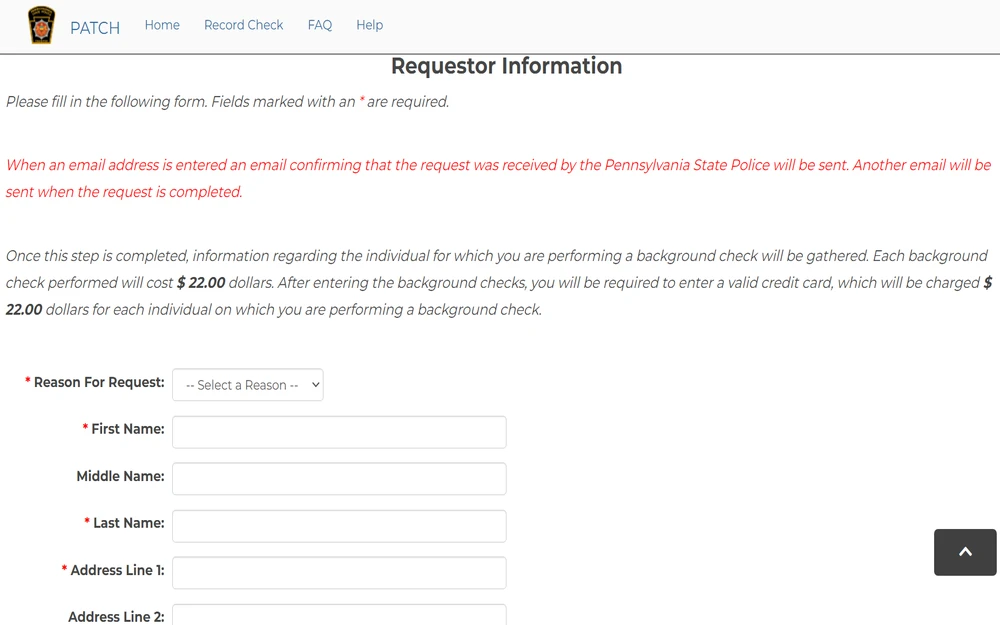
The Pennsylvania State Police maintain an active compilation of current warrants and records on file as well.6 While it doesn’t have an online search feature, requests for warrants can be mailed or made in person by directing the inquiry to:
Pennsylvania State Police
Custodian of Records
1800 Elmerton Avenue
Harrisburg, PA 17110
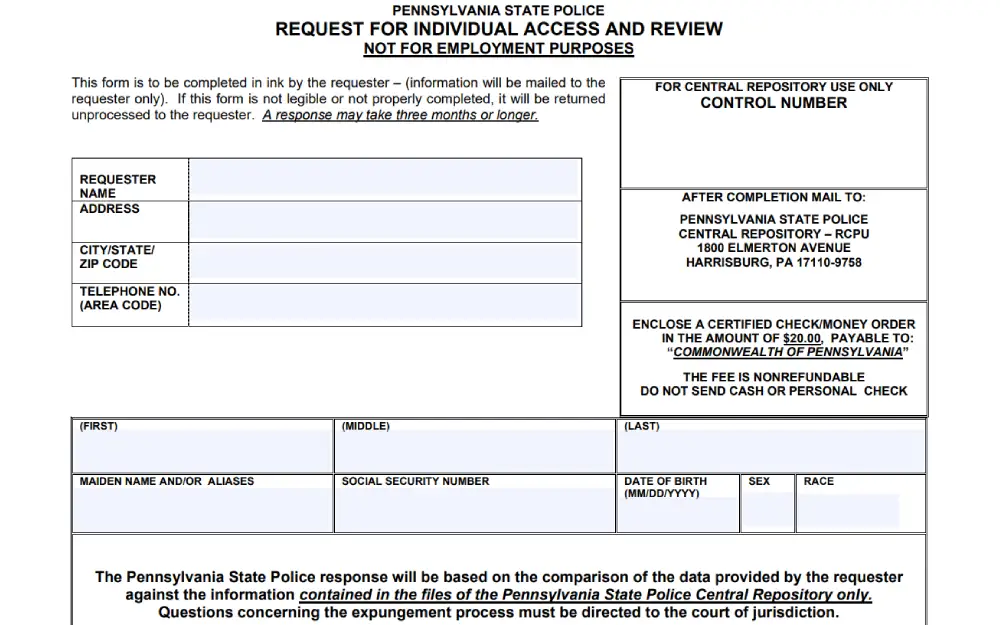
If a document requested contains more than 10 pages, the individual conducting the search will be charged $0.15 per page. A phone call can also be made to (717)705-4245.
A third, rather limited resource for a free warrant search is the Pennsylvania Parole Board’s Most Wanted Absconders.8 It maintains records of warrants issued for the arrest of individuals in violation of their parole or probation. A PDF document of the most wanted list also exists.
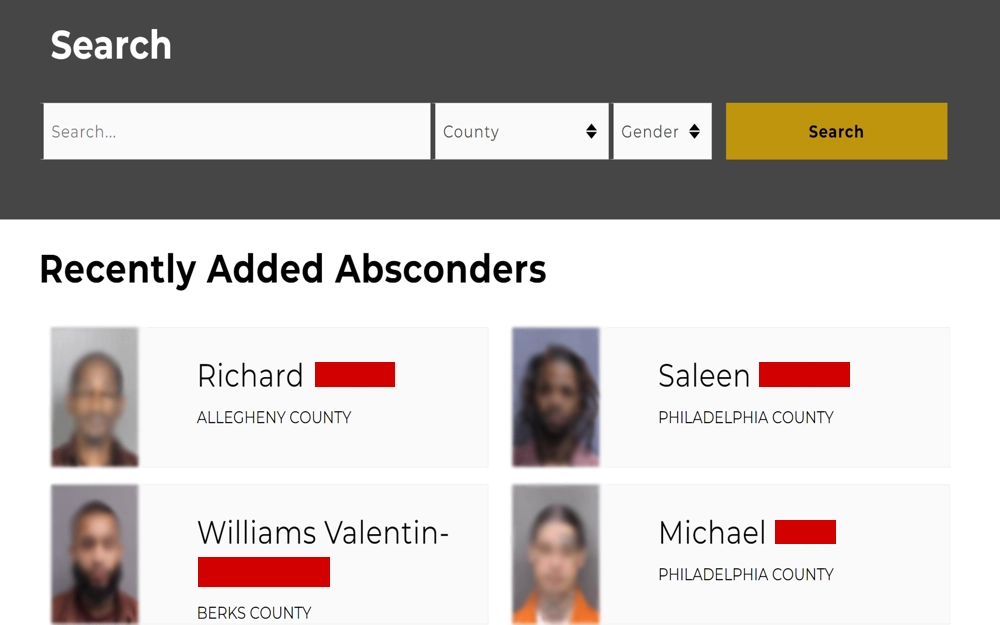
Look Up Pennsylvania Warrants at the County Level (Courts & Law Enforcement Agencies)
There are 67 counties in Pennsylvania. Philadelphia County is the most populous county in the Commonwealth and has the same boundaries as the city of Philadelphia.
Records of warrants can be obtained from the municipal court clerk or the county sheriff’s office in each county. For most records, individuals will need first and last names or court dates, but searching in the county where the offender resides will also help expedite the request process.
Below is a table of the most populous counties in Pennsylvania and details of the county clerk or sheriff’s office where warrant searches can be conducted. This can be done in person, by mail or via a phone call to the agency.
When a website is available, it’s provided for each respective resource. The majority of the court clerks direct warrant searches to the PA Unified Judicial System portal; you can also refer to the Philadelphia County warrant lookup tutorial and the instructions for checking Allegheny County warrant details for additional insights and clear examples of county-level searches.
| County | Court Clerk | Law Enforcement |
| Philadelphia | Philadelphia County Municipal Court 1301 Filbert Street Philadelphia, PA 19107 Phone: (215) 683-7700 Fee Schedule |
Philadelphia Sheriff’s Office 100 South Broad Street #5 Philadelphia, PA 19110 Phone: (215) 686-3530 |
| Allegheny | Court of Common Pleas 436 Grant Street, Room 220 Pittsburgh, PA 15219 Phone: (412) 350-5500 |
Allegheny County Sheriff’s Office 436 Grant Street Pittsburgh, PA 15219 Phone: (412) 350-4700 |
| Montgomery | Court Criminal Divison 2 East Airy Street Norristown, PA 19401 Phone: (610) 278-3000 Division Emails Fee Schedule Forms FAQs |
Montgomery County Sheriff’s Office 2 East Airy Street Norristown, PA 19401 Phone: (610) 278-3331 |
| Bucks | Clerk of Courts 100 North Main Street Doylestown, PA 18901 Phone: (215) 348-6389 Fax: (267) 885-1371 Email: [email protected] Right to Know Request Form |
Bucks County Sheriff’s Office 100 North Main Street #4318 Doylestown, PA 18901 Phone: (215) 348-6124 Criminal Warrants Division: (215) 348-6126 |
| Delaware | Clerk of Court 201 West Front Street Media, PA 19063 Phone: (610) 891-4370 Email: [email protected] FAQs |
Delaware County Sheriff’s Office 201 West Front Street Media, PA 19063 Phone: (610) 891-4296 |
Contact Municipal Agencies & Courts in PA for Warrant Details
Within each county, individual cities and townships also maintain current records of warrants in their region. Options are available to get in touch with these offices to inquire about a warrant search for a specific person.
| City/Township | Court Clerk | Law Enforcement |
| Philadelphia | Philadelphia Warrant Search 750 Race Street Philadelphia, PA 19106 Phone: (215) 686-1776 |
Philadelphia Sheriff’s Office 100 South Broad Street #5 Philadelphia, PA 19110 Phone: (215) 686-3530 |
| Pittsburgh | Pittsburgh Municipal 660 1st Avenue Pittsburgh, PA 15219 Phone: (412) 350-6715 |
Pittsburgh Bureau of Police 1203 Western Avenue Pittsburgh, PA 15233 Phone: (412) 323-7800 |
| Allentown | Lehigh County Clerk 455 West Hamilton Street Allentown, PA 18101 Phone: (610) 782-3014 Email Form Fee Schedule for Copies |
Allentown Police Department 425 Hamilton Street Allentown, PA 18101 Phone: (610) 437-7751 |
| Reading | Court Warrant Search 633 Court Street, 3rd Floor Reading, PA 19601 Phone: (610) 478-6240 Fee Schedule |
Reading Police Department 815 Washington Street Reading, PA 19601 Phone: (610) 655-6116 |
| Erie | Erie Magisterial Court 140 West 6th Street #400 Erie, PA 16501 Phone: (814) 451-6254 |
Erie Police Department 626 State Street Erie, PA 16501 Phone: (814) 870-1125 |
Expand Your Search Beyond Pennsylvania & Access Federal Warrants
In addition to the local, city and state resources provided above, there are some options for warrant searches at the federal level.
These warrants are issued for crimes deemed serious enough to require the involvement of federal authorities. As these types of warrants are typically reserved for agencies such as the Federal Bureau of Investigation (FBI), access isn’t commonly open to the public.9
The state of Pennsylvania operates an active crime watch website that contains known details about active warrants and potential criminal violators. At the federal level, these three sites are the most commonly used:
- FBI’s Ten Most Wanted Fugitives
- DEA’s Most Wanted Fugitives
- U.S. Marshals Service – 15 Most Wanted Fugitives

Individuals can also use the Public Access to Court Electronic Records (PACER) to find federal arrest and search warrants. To do so, search the person’s name, click “Case Number” and select the “Docket Sheet/Docket Report” and/or “History/Documents” query. Fees are assessed by the page.11
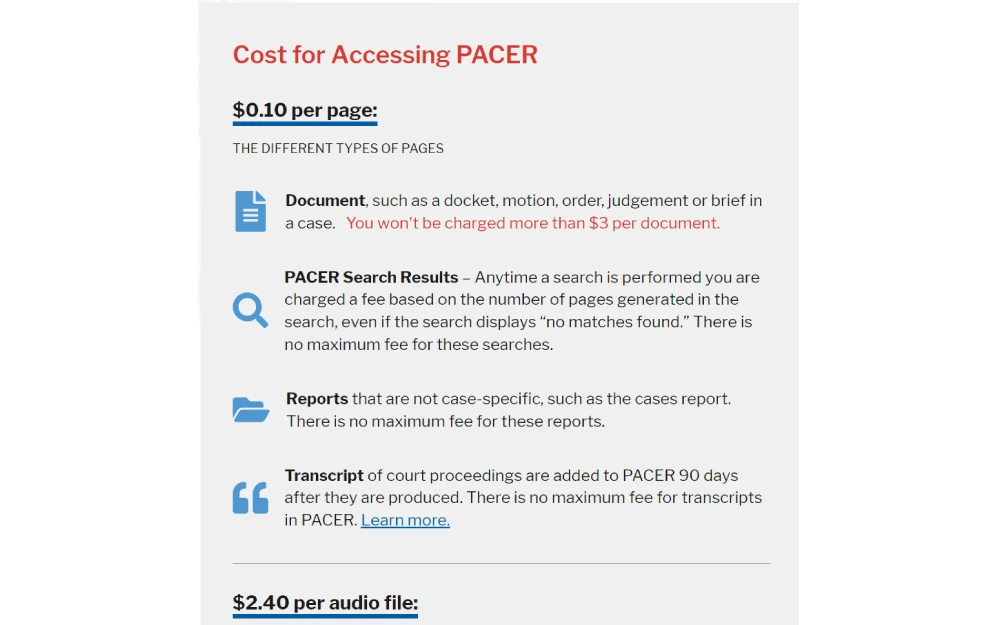
Warrants don’t typically appear in this database until the offender has been arrested.
Other than these resources, a criminal offense attorney can assist with a Freedom of Information Act (FOIA) request through the U.S. Marshals Service. This department executes but doesn’t issue most federal warrants. The Warrant Information System, through this service is unfortunately not made available to the public.
Primary Types of Warrants in Pennsylvania & What They’re Issued For
This section delves into the primary types of active warrants in the Commonwealth and sheds light on what might prompt their issuance by law enforcement. While individuals may discover most warrants through court notifications received by mail, it’s still possible to proactively look up warrants using the methods outlined in previous sections.
- Arrest Warrants: These can be categorized into outstanding warrants and Ramsey warrants. Title 234, Chapter 5, Part B(3) of the Pennsylvania Code covers the issuance directives.12
- Outstanding Warrants – are active arrest orders held in police and FBI databases that couldn’t be enforced immediately upon issuance. These possess the same authority as active detention directives. Information on outstanding warrants can be accessed through various agencies, including the clerk of court, magistrate’s court and local law enforcement.
- Ramsey Warrants – refer to arrest orders issued prior to criminal charges being filed. While the usual process involves filing a probable cause affidavit with the magistrate before issuing a warrant, a Ramsey warrant allows for pre-filing an arrest warrant under specific circumstances.
- Administrative Warrant: This warrant is used for retaking parole violators and doesn’t require the filing of an oath or affirmation. It bypasses the Fourth Amendment typically required for regular arrest warrants.
- Bench Warrants: A judge may issue a formal order to apprehend an individual who’s defied a court directive. Pennsylvania bench warrants are issued by a judge or district magistrate to re-arrest defendants who’ve violated probation or parole conditions, neglected to pay court fees and fines for traffic violations or failed to appear in court.
When in possession of these warrants, law enforcement is empowered to enter residences where there’s probable cause to believe the defendant is hiding, even without establishing that cause through an affidavit.
- Capias Warrants: This is an order to arrest and detain an individual to guarantee a court appearance. It’s not typically associated with the search of a residence or the seizing of personal property. A more common name for this is a writ of arrest.
- No-Knock Warrant: Typically, law enforcement officers must notify residents prior to their entrance in accordance with the Fourth Amendment. However, when the notification could lead to the destruction of critical evidence, compromise an officer or individual’s safety or cause a suspect to flee, a warrant allowing entrance without knocking may be issued. As a general rule, Pennsylvania doesn’t explicitly permit warrants of this nature.
- Steagald Warrant: This warrant may be required when an accused person is located in or on premises belonging to a third party. It allows law enforcement officials to enter the property in the absence of the owner and is in addition to the active warrant issued in the suspect’s name.
- Child Support Warrants: A warrant for child support arrest empowers law enforcement to apprehend a delinquent payor, typically a parent behind on child support payments, and compel them to appear in court. Unlike standard arrest warrants, child support warrants are often civil in nature. The primary objective is to ensure the attendance of a noncustodial parent at a non-support hearing and prompt the payment of overdue amounts.
Any potential jail sentence serves as a means to secure the support required of the parent.
- Telephonic Warrant: These are issued through communication via telephone between a magistrate and an affiant. They’re equal to those obtained through an in-person warrant hearing and often due to an urgent need for the warrant that wouldn’t allow time for an in-person meeting.
- John Doe Warrant: Also known as a DNA warrant, this order is issued without proper identification of the defendant or suspect, leaving them described simply as “John Doe” and providing a DNA profile.
- Search Warrants: These warrants are issued when police need to enter a property and search for evidence. These are based on probable cause and are valid for a specific time. They can be obtained in anticipation of evidence becoming available in the future.
Managing Warrants for Yourself or Someone Else (PA)
If a warrant is suspected for yourself or someone you know, follow the steps outlined below to check and handle active warrants in Pennsylvania.
- Utilize online resources in PA counties: Check sheriff’s or police websites and the clerk of court’s online databases where available. Larger cities and counties usually have comprehensive online databases, but smaller rural areas may require a phone call for information.
- Federal arrest warrants: If a federal warrant is suspected, contact the federal court in the district for verification.
- Contact the PA police department: Reach out to request an active warrant list or conduct a name lookup in the warrant database over the phone. Not all departments will provide the information without asking the nature of your request. To add an extra layer of protection, consider having someone else inquire.
- Bondsman accessibility: Bail bondsmen in Pennsylvania often have access to local warrant details. Contact them by phone, and they may be able to provide information on active warrants.
- If you’re worried for your or another person’s safety, notify a law enforcement tip line.13
Sometimes, a warrant search is conducted, and the results reveal a warrant for the individual making the inquiry, either in person or online. If this happens to you, here are a few guidelines for personally dealing with an arrest warrant in Pennsylvania:
- Stay calm and avoid fleeing: In extreme situations, major transportation hubs may be alerted to prevent departure from the state or country.
- Strategize before surrendering: Resist the impulse to surrender without a plan. Develop a strategy and inform trusted individuals who can assist with bail and other post-booking arrangements.
- Acknowledge the warrant: Ignoring the warrant won’t make it disappear. Arrest warrants in Pennsylvania don’t have an expiration date.
- Avoid overreacting: Having a Pennsylvania warrant doesn’t necessarily lead to immediate jail time. It might involve simply settling a fine or rescheduling a court date.
- Pay any fines: Sometimes, responding to a warrant involves nothing more than paying outstanding fees and settling your account.
- Consult an attorney: Retain a Pennsylvania attorney for invaluable guidance throughout a case. Despite the cost, legal representation can help navigate surrendering to the police and work out bail arrangements in advance for a prompt release.
This resource is designed to help citizens exercise their rights and have their civil liberties remain protected while running a Pennsylvania warrant search; for more details on residents statewide, refer to the Pennsylvania free public information search steps (for guidance on obtaining records of court cases, background checks, mugshots, etc.) and the PA arrest and criminal history lookup overview.
References
1Pennsylvania Code & Bulletin. (n.d.). Dissemination of Search Warrant Information. Retrieved March 20, 2024, from <https://www.pacodeandbulletin.gov/Display/pacode?file=/secure/pacode/data/234/chapter2/s212.html&d=reduce>
2Unified Judicial System of Pennsylvania. (n.d.). Warrant search. Retrieved March 20, 2024, from <https://ujsportal.pacourts.us/WarrantSearch>
3Unified Judicial System of Pennsylvania. (2024). Case Search. Retrieved March 20, 2024, from <https://ujsportal.pacourts.us/CaseSearch>
4Pennsylvania State Police. (n.d.). Criminal history background check. Retrieved March 20, 2024, from <https://www.psp.pa.gov/Pages/Criminal-History-Background-Check.aspx#RequestStatus>
5Pennsylvania State Police. (n.d.). Requestor Information. Retrieved March 20, 2024, from <https://epatch.pa.gov/TandCRce/RequestorDetails/RequestorInfo>
6Pennsylvania State Police. (n.d.). Requests for Records and Subpoenas. Retrieved March 20, 2024, from <https://www.psp.pa.gov/records/Pages/default.aspx>
7Pennsylvania State Police. (2020, December). Request for Individual Access and Review. Retrieved March 20, 2024, from <https://www.psp.pa.gov/Documents/CrimHist/SP4-170.pdf>
8Pennsylvania Board of Probation and Parole. (2024). Most Wanted Absconders. Retrieved March 20, 2024, from <https://www.pa.gov/pbpp/absconders/>
9Federal Bureau of Investigation. (n.d.). How We Investigate. Retrieved March 20, 2024, from <https://www.fbi.gov/investigate/how-we-investigate>
10Federal Bureau of Investigation. (n.d.). Ten Most Wanted Fugitives. Retrieved March 20, 2024, from <https://www.fbi.gov/wanted/topten>
11Public Access to Court Electronic Records (PACER). (n.d.). PACER pricing – How fees work. Retrieved March 20, 2024, from <https://pacer.uscourts.gov/pacer-pricing-how-fees-work>
12Pennsylvania Code & Bulletin. (n.d.). Chapter 5. Pretrial Procedures in Court Cases. Retrieved March 20, 2024, from <https://www.pacodeandbulletin.gov/Display/pacode?file=/secure/pacode/data/234/chapter5/chap5toc.html&d=reduce>
13Pennsylvania State Police. (n.d.). Report a tip by phone or online. Retrieved March 20, 2024, from <https://www.psp.pa.gov/Pages/Report-a-tip-by-phone-or-online.aspx>
